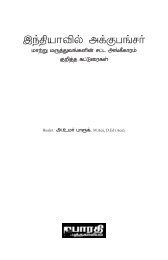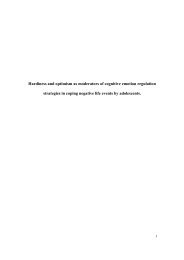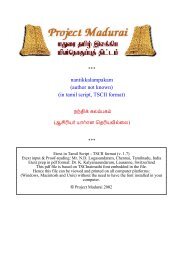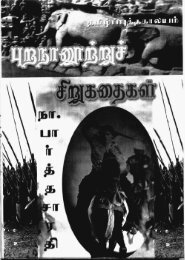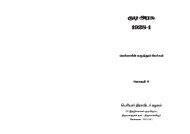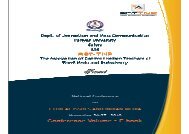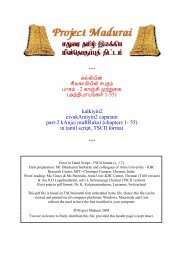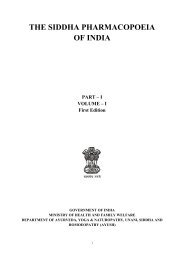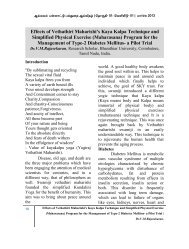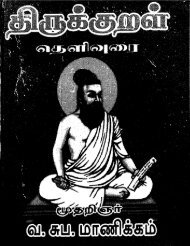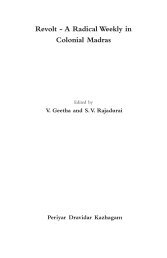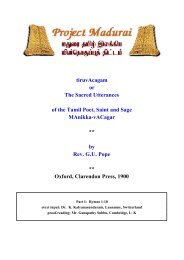THE FUNDAMENTAL RULES OF THE TAMIL NADU GOVERNMENT
THE FUNDAMENTAL RULES OF THE TAMIL NADU GOVERNMENT
THE FUNDAMENTAL RULES OF THE TAMIL NADU GOVERNMENT
- No tags were found...
You also want an ePaper? Increase the reach of your titles
YUMPU automatically turns print PDFs into web optimized ePapers that Google loves.
(i) For the purpose of this proviso, the status of a Government servant while on foreign service,i.e., Group A and B or Group C and D should be determined with reference to the permanent postsunder Government on which he holds a lien or would hold a lien had his lien not been suspended, or,if during his absence on foreign service he is given any promotion under Rule 113, with reference tothe post under Government to which he is so promoted.(ii) in the case of such a Government servant, the term “his pay” occurring in item (i) of thisproviso should be construed to mean what is prescribed under rule 117(b) for counting his pay for thepurpose of Rule 9(2) i.e., the pay drawn in foreign service at the time leave is taken less in the case ofa Government servant paying his own contribution for leave-salary and pension, such part of the payas may be paid as contribution.(iii) The expression “the pay he would draw in the permanent post held substantively by him atthe time of taking leave” occurring in this proviso should, in its application to a Government servant onforeign service, be taken to mean the pay which he would draw in the permanent post underGovernment on which he holds a lien, or would hold a lien had his lien not been suspended at thetime of taking leave.(Government of India, Finance Department Letter No.F.723-RI/43, dated 17th July 1943, to all ChiefCommissioners.)Pay and status for purpose of the proviso under Rule 87(4) For the purpose of the proviso in this rule, they pay and status of Government servant shouldbe determined with reference to the post which he was holding whether in a substantive or in anofficiating capacity before going on leave.(G.O. Ms. No. 532, Finance, dated 2nd July 1926.)Interpretation of the term “pay” in the expression “the pay which he would draw”, occurring inclause (ii) of the proviso.(5) This term should be interpreted as including “Special Pay” whether attached to a post orpersonal to a particular Government servant, since in either case the Government servant would drawit in the post which he holds substantively.(G.I., F.D., Letter No.F.374-C.S.R., 26, dated 27th November 1926.)(6) When a Government servant belonging to a cadre is actually holding substantively a particularpermanent post in the cadre at the time of taking leave, he must be considered as the substantiveholder of that particular post at the time and if a special pay is attached to that post, he may, if theother conditions of the first proviso to Rule 87 are fulfilled, draw leave-salary equal to his substantivepay plus the special pay which he was drawing at the time of taking leave.(Comptroller and Auditor-General’s Letter No.T.717-A/167-38, dated 13th July 1938, to Accountant-General, Central Revenue, received with the Comptroller and Auditor-General’s Endt. No.331-A/167-38, dated 16th July 1938.)Note.—When the special pays for typewriting and shorthand are not attached to any particular postbut are sanctioned for a particular office or offices as a whole (i.e., special pays for shorthand andtypewriting in the Judicial Department) a Government servant who is in receipt of such special pay atthe time of proceeding on leave, cannot draw the special pay as part of the pay of the post heldsubstantively by him at the time of taking leave under the first proviso to Rule 87 but can draw onlyaverage pay as defined in clause (2) of Rule 9.Similarly, special pays for unhealthy localities are treated as not attached to a post and can,therefore, be taken into account only for calculating average pay.[Public (Services) Memo.No.25965/38-3, dated 25th October 1938 and Finance Memo. No. 13898,C.S.R., dated 21st June 1939 and Home Department Letter No.2978, dated 30th May 1939, to theChief Justice.]Interpretation of the words “permanent post” occurring in the same clause.(7) The permanent post may be a post on which the Government servant’s lien has beensuspended if he holds a lien on no other permanent post.(G.I., F.D., U.O.No.787-C.S.R., dated 2nd March 1926.)132



